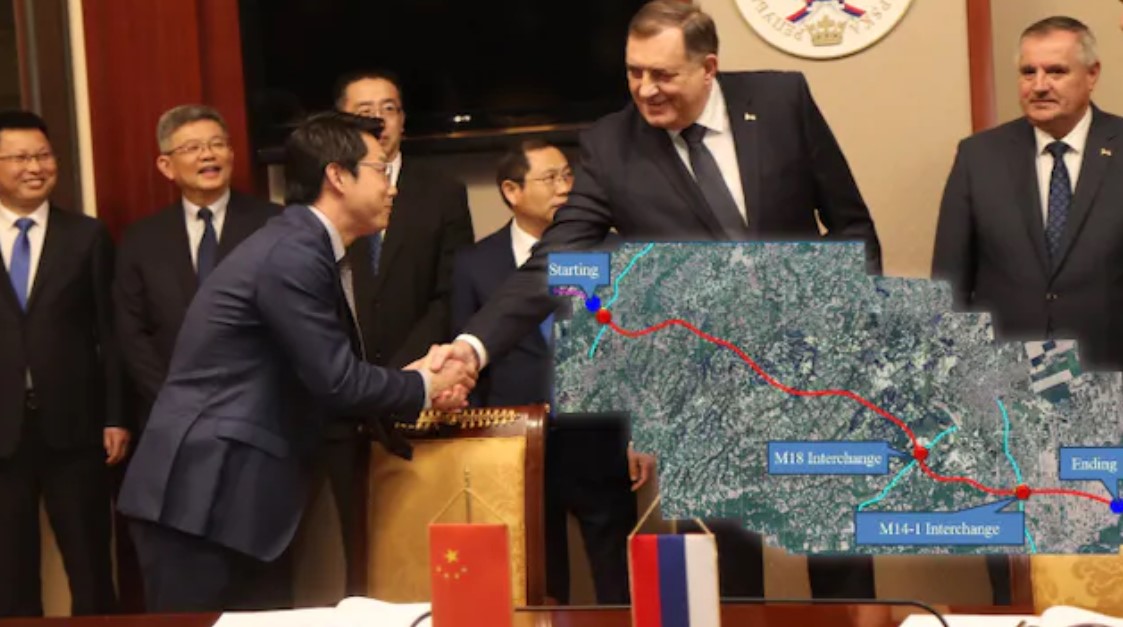In Banja Luka, on February 24th, a contract was signed with a Chinese consortium for the construction of a 17-kilometre section of the highway Brčko – Bijeljina, in the presence of Dodik.
While the EU continues to adopt measures to reduce the impact of Chinese investments, and overall dependence on China, the authorities of Republika Srpska are opening doors to Chinese companies in many major infrastructure projects, particularly along the Banja Luka – Bijeljina route.
Written by: A. DUČIĆ/Fokus.ba
At the end of last month, the authorities of Republika Srpska awarded another lucrative contract to Chinese companies. This pertains to a project worth nearly 350 million KM, specifically the construction of a section of the highway Brčko – Bijeljina, another one being built under the auspices of a force from the Far East.
The Brčko – Bijeljina highway section was supposed to be part of a mega-project involving three countries, Bosnia and Herzegovina – Serbia – Turkey, according to earlier documents dating back to 2019. Connecting the two main cities in the northeast of BiH was envisaged, among other things, through this section.
Three and a half years later, the Brčko – Bijeljina section has become a project of Republika Srpska. Nevertheless, the RS entity conducted the tender worth almost 350 million KM independently.
In Banja Luka, on February 24th of this year, a contract was signed in the presence of the President of RS, Milorad Dodik, for the construction of a 17-kilometre section of the highway Brčko – Bijeljina with a Chinese consortium consisting of China Overseas Engineering Group Co. LTD (COVEC) and China Tiesiju Civil Engineering Group Co, LTD, as well as China Construction Bank as a financing partner.

Facsimile of the decision on the selection of the construction contractor for the 17-kilometre section of the Brčko – Bijeljina highway
The same Milorad Dodik, as a member of the Presidency of Bosnia and Herzegovina, together with his former colleagues in the Presidency, Željko Komšić and Šefik Džaferović, and the President of Turkey, Recep Tayyip Erdogan, laid the cornerstone for the Sarajevo – Belgrade highway in Ankara on October 8, 2019, and on March 16, 2021, he signed an agreement for the construction of this highway.
IT STARTED BACK IN 2014
This agreement was later approved by the Council of Ministers of Bosnia and Herzegovina, and the highway was supposed to be built by the Turkish company Tasyapi Insaat, which sent an official offer to the then Minister of Communications and Transport of BiH, Vojin Mitrović (SNSD), at the end of September 2021.
However, during the period when these events took place, it seems that it was already widely known that the contract for the construction of the Brčko – Bijeljina section would ultimately be awarded to the Chinese. This was revealed, among other things, by a PowerPoint presentation of Autoputevi RS (Highways of Republika Srpska) dating back to May 2014, obtained by Fokus.ba.
The Chinese company China Road and Bridge Corporation, which has a number of projects in Serbia, had already conducted extensive terrain research and preparatory activities for the construction of the Brčko – Bijeljina section long before the trilateral meeting of Bosnia and Herzegovina, Serbia, and Turkey, gathered around the “Sarajevo – Belgrade Highway” Project. This indicates that the groundwork was being laid for the Chinese investor.
After all the preparations were made, Autoputevi RS (Highways of Republika Srpska) issued a tender on December 10, 2022, after receiving the green light from the RS Government, and the tender was conducted in record time. As mentioned earlier, the contract was awarded to the Chinese.
Within just a few years, the authorities of Republika Srpska had awarded contracts for the construction of three sections of the highway to Chinese companies, so from the perspective of the entity authorities, it was logical for the northeastern part of Bosnia and Herzegovina to also be assigned to the Chinese for the construction of the highway.

Map of shares in the RS that in a few years went to the Chinese
Namely, in December 2018, a concession agreement was signed with the consortium China Shandong International Economic and Technical Cooperation Group for the construction of a 40-kilometre highway section between Banja Luka and Prijedor for approximately 600 million KM. Last year, in the summer, one year after the tender was issued for the construction of the Vukosavlje – Brčko highway section, the contract was awarded to the Chinese company China State Construction Engineering Corporation Limited. The project, instead of the estimated 702 million KM, will cost 765.7 million KM.
In addition to the fact that the construction of another highway section connecting Banja Luka with the border of Bosnia and Herzegovina and Serbia was awarded to Chinese investors, these three projects have some other common points. One of them relates to the confidentiality of the contracts. According to Prime Minister Radovan Višković, the authorities of Republika Srpska have no problem with disclosing the contract for the Brčko – Bijeljina section, “but the Chinese side has exclusivity over this contract, so if they allow it to be disclosed, it will be disclosed.”
However, it is difficult to believe that this will happen, given the fact that the authorities of Republika Srpska have not yet complied with court rulings that require them to disclose the concession agreement for the Banja Luka – Prijedor highway section. Namely, the Ministry of Traffic and Communications of Republika Srpska has refused the Center for Environmentally Responsible Development access to information about the economic justification of the Banja Luka – Prijedor highway, despite the fact that an administrative dispute was won at the District Court in Banja Luka.
WILL THE CHINESE BE PAID FROM THE BUDGET?!
Transparency International Bosnia and Herzegovina won a legal dispute against the Ministry of Traffic and Communications of Republika Srpska at the end of 2022 for not disclosing the concession agreement for the construction of the Banja Luka – Prijedor highway. Transparency International Bosnia and Herzegovina initiated the legal proceedings due to suspicions that this deal was made under detrimental conditions for Republika Srpska.
According to the contract, the Chinese company was supposed to earn around 975 million euros in toll revenue during the 30-year concession period, with an investment of nearly 300 million euros. The missing funds were supposed to be compensated from the budget of Republika Srpska, which Transparency International Bosnia and Herzegovina considers “very detrimental” to public finances.
Srđan Traljić from Transparency International Bosnia and Herzegovina says to Fokus.ba that this approach by Chinese investors has been present from the beginning. However, he notes that the responsibility lies not with them but with our authorities.
– Transparency International Bosnia and Herzegovina obtained a first-instance judgment in the case of concealing the contract for the Banja Luka – Prijedor section, in which it is clearly stated that this is information of public interest and that the Ministry of Traffic and Communications of Republika Srpska must explain whether favourable conditions have been negotiated for Republika Srpska and its citizens, and where it is stated that the task of the Ministry is not to protect the private interests of investors, but the interests of citizens. However, despite the clear judgment, they have once again refused to disclose the contract. In fact, they have issued a new decision in which they have found a new reason, so now we are going into a new legal dispute and it will take time”, says Traljić.
Furthermore, the public has not had access to the contract for financing, designing, and building the Vukosavlje – Brčko section of the highway to this day.
In contrast to the cost of the Banja Luka – Prijedor section, which amounts to 15 million BAM per kilometre, the cost of the Brčko – Bijeljina or Vukosavlje – Brčko section is 23.8 million BAM per kilometre, or 23.1 million BAM. A justified question that can be raised in this context is why the sections towards the northeast of Bosnia and Herzegovina are twice as expensive, considering that they are in a relatively flat area.
– Almost all institutions have the same approach. If they want to avoid the essence of the judgment, they can find a new excuse in a new decision for not disclosing this information, but it is important to emphasize that the essence of this judgment is clear. Considering that these are extremely valuable contracts worth hundreds of millions of marks, it is not good to hide such contracts from the public”, says Traljić.
He points out that for a country with this level of corruption (such as Bosnia and Herzegovina), doing business with investors who set such conditions can often be detrimental to the protection of public interest.
– So, we are not saying that all investors have bad intentions, but we are only warning that there are numerous corruption risks. It is a trend that we have seen in recent years, where our authorities have turned to creditors who do not impose such conditions in order to avoid the strict conditions of international creditors regarding fiscal responsibility, anti-corruption measures, and other painful reforms. However, there are numerous risks that these projects may cost us too much or result in damage to the public interest. We have seen, for example, in the case of Montenegro, that a loan for a highway, which is considered by many as an unprofitable project, has put that country in a situation where it could not service its obligations”, he emphasizes.
“Incompetent” Turks and Americans
In May 2021, the Highways of Republika Srpska (RS) cancelled an international tender for the construction of all three sections from Vukosavlje to Raca, with a total value of 1.3 billion KM, stating that “there is not a single capable candidate for the job.” Among the “incompetent” companies were several Turkish companies, as well as the major American company Bechtel, which was bidding together with the leading Turkish company in this field, Enka.
In the Decision of the Highways of Republika Srpska on the selection of the most favourable bidder, we found an interesting detail that indicates collusion (an implicit agreement between bidders). Namely, the second bidder for the construction of the Brčko-Bijeljina section was another Chinese consortium, namely Sinohydro Corporation Limited and Power Construction Corporation of China Limited.

The Public Procurement Commission eliminated this second consortium, even though it had a bid that was around 30 million KM cheaper, for what appears to be trivial reasons. As stated, this consortium failed to provide in the tender documentation the name of the bank through which they would secure the credit for financing the project. Additionally, they omitted, as explained in the Decision, to provide documentation of not being involved in criminal proceedings or other evidence of non-participation in corruption, which are integral parts of almost every tender documentation.

Detail of the decision stating that the second bidder failed to mention the name of the bank
Taking into consideration that, specifically in the case of Sinohydro Corporation Limited, which has won several major tenders throughout Bosnia and Herzegovina, including the construction of the Počitelj Bridge as part of the segment of the Corridor 5C highway, it is hard to believe that such oversights would have occurred if they had ultimately intended to win this tender.
In their response to Fokus.ba, the Public Enterprise Highways of Republika Srpska stated that this procurement entails the conclusion of two contracts and that the signing of the credit agreement is still pending. They promised that when this happens, both contracts will be published on the Public Procurement Portal. It remains to be seen whether this promise will be fulfilled.
As for the construction of the Banja Luka – Prijedor highway segment, they remind that this process was carried out through a concession, in accordance with the Concession Law, and the signatory is the Government of Republika Srpska. On the other hand, the construction of the Vukosavlje – Brčko and Brčko – Bijeljina highway segments, as they state, was carried out through one of the procedures prescribed by the Public Procurement Law, namely competitive dialogue (Vukosavlje – Brčko) and open procedure (Brčko – Bijeljina).
Therefore, transparent procedures were followed, where all potential bidders were given the opportunity to participate, and the PE “Highways of Republika Srpska” fully respected and applied the basic principles of public procurement. In the aforementioned procedures, the basic principles of public procurement were respected and applied, which is the essence of the principles of fair and active competition, to provide all economic entities with the opportunity to obtain contracts – stated the Highways of Republika Srpska.
We have also made an official inquiry to China Railway Group Ltd, the owner of COVEC, but no response has been received.
COVEC’S UNFINISHED HIGHWAY
Fokus.ba has investigated the background of Chinese companies that were awarded contracts by the RS government for the Brčko-Bijeljina highway section. One of them, China Overseas Engineering Group Co. Ltd (COVEC), was involved in the construction of a large bridge in the city of Sigiri, Kenya, in 2017. According to reports from international media, just 12 days after the President of Kenya visited the bridge to assess the progress of the construction, a part of the structure collapsed, costing $11.5 million. Twenty-seven workers were injured. COVEC subsequently admitted responsibility for the failures.
In September 2009, COVEC won a tender for the construction of the A2 highway connecting Warsaw with Berlin, but failed to complete the project and withdrew from Poland. This was the first project for Chinese companies on EU soil, and it was investigated by the prestigious Wall Street Journal.
Poland’s compensation claim amounted to 200 million euros. The construction of that highway was supposed to be completed by the 2012 UEFA European Football Championship. Chinese companies had offered to build this highway at half the cost estimated by Polish authorities. European companies had filed complaints claiming that COVEC could not build and profit at that price.
According to the Wall Street Journal, the A2 highway between Warsaw and Berlin was supposed to be an opportunity for Chinese construction to shine on the European stage after years of mega-projects at home and in developing countries. Poland was eager to complete the project before the European football championship, which started on June 8, and which Poland co-hosted with Ukraine for the first time. Instead, a crucial section of about 50 kilometres became a victim of poor planning, strict regulations, and costs exceeding expectations.
In 2021, the Balkans Investigative Reporting Network (BIRN) identified 135 projects worth at least 32 billion euros in the Western Balkans region that were somehow connected to China. In Republika Srpska, according to this research, there were 29 such projects, out of which 18 were related to infrastructure and energy.

fokus.ba



